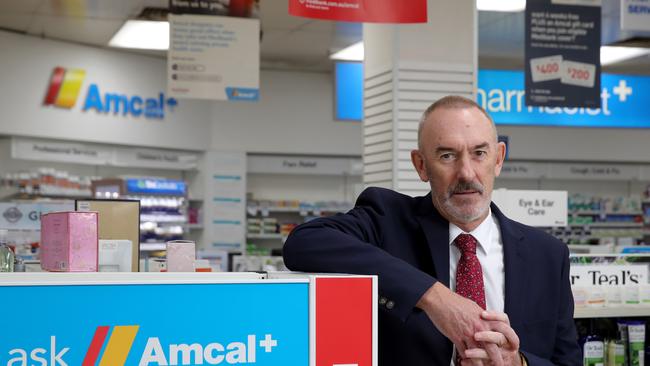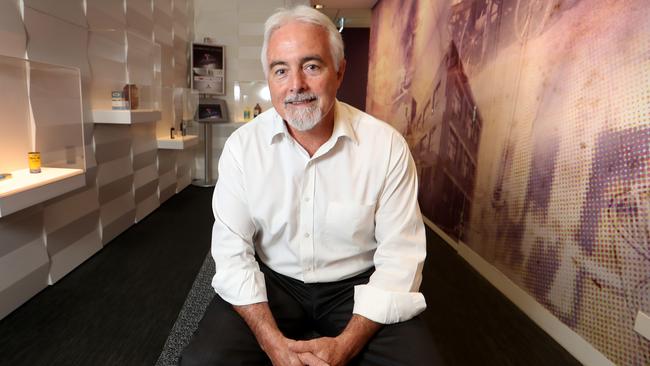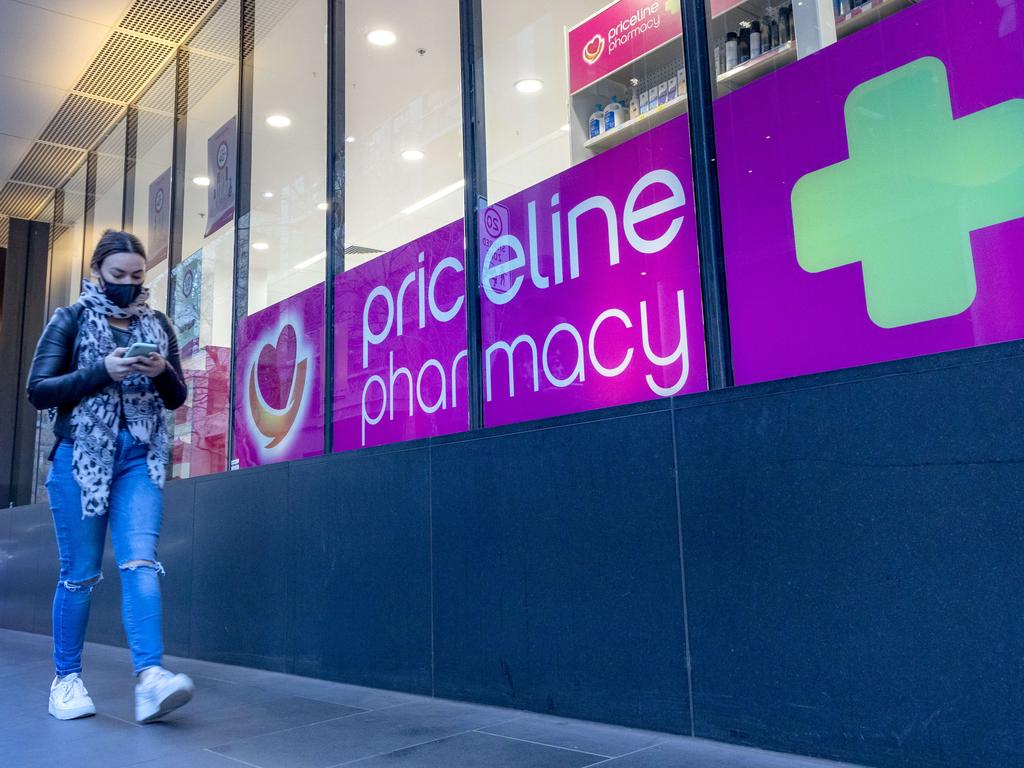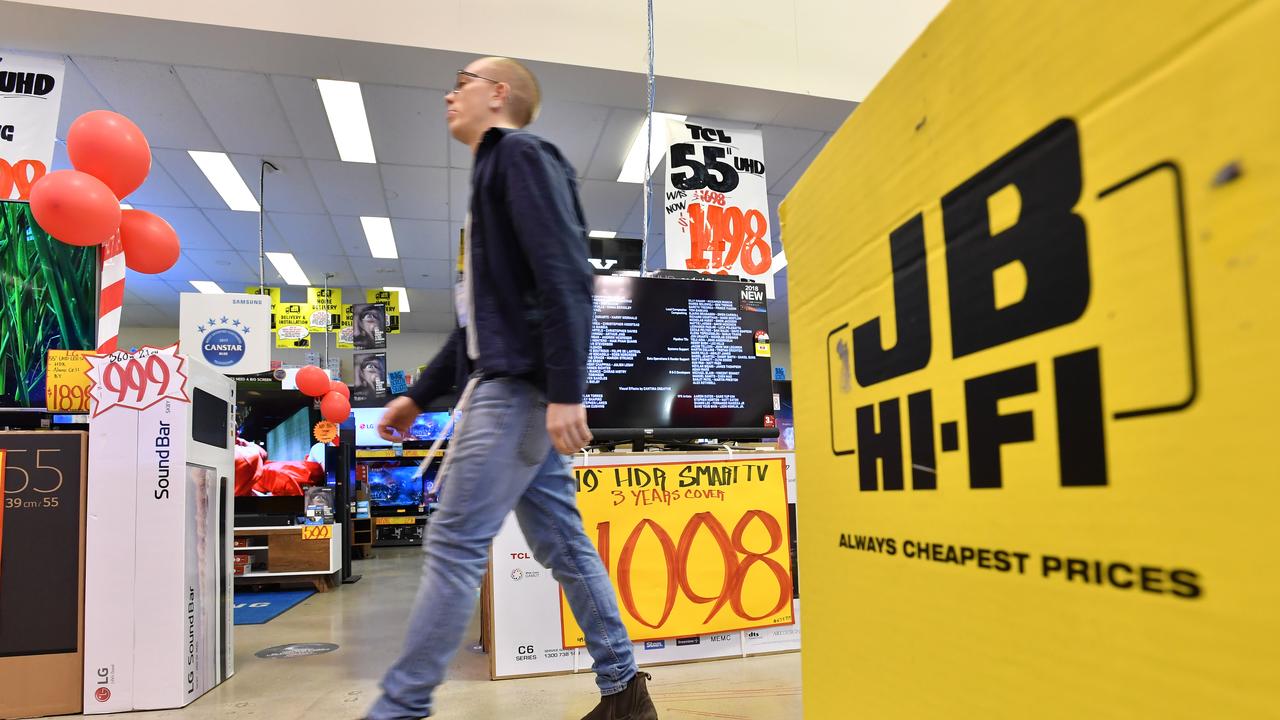Sigma lobs $773.3m bid for API to combat Wesfarmers pharmacy takeover fear
Sigma Healthcare’s $773m takeover move on Priceline owner API faces fierce resistance from the bidder’s biggest shareholder.

Priceline owner, Australian Pharmaceutical Industries, has managed to jump-start bigger rival Sigma Healthcare into revising merger talks in an effort to fend off overtures from retail titan Wesfarmers.
But Sigma’s bid faces fierce investor resistance, with its biggest shareholder branding it “economically irrational” and “value destroying”.
After strongly rejecting overtures from API two years ago, Sigma has lobbed a $773.3m cash and scrip bid for its smaller rival. This is $9.7m higher than Wesfarmers’s all cash bid.
But Simon Mawhinney of Allan Gray, which owns 10.1 per cent of Sigma, said the deal does not make sense.
“I think it‘s a completely value destroying transaction,” Mr Mawhinney said.
“Only two years ago, a similar transaction was initiated in reverse, where API sought to merge with Sigma shareholders, and actually the terms of that deal would have been more favourable for Sigma shareholders.
“The board at the time heavily knocked back the prior deal, and are obviously now campaigning for this deal. It makes no sense. If the last one was bad for shareholders, how is it that this one is good for shareholders?”
Sigma has offered API shareholders 35c cash and 2.05 Sigma shares for every API share, which it said implies a value of $1.57 per API share. If successful, API shareholders would own 48.8 per cent of Sigma, near halving the holding of existing Sigma shareholders.
“To me, this feels like a combination of the fear of missing out, it feels like a bunch of investment bankers, pulling one over Sigma’s eyes,” Mr Mawhinney said.
“It feels like the board just being completely economically irrational, and it just seems to me that this is a complete misallocation of capital, which Sigma shareholders will pay the pastors, for years to come.”
The Australian also understands that Sigma is yet to contact API’s biggest shareholder, Washington H. Soul Patts, which has agreed to sell its 19.3 per cent stake in API to Wesfarmers in absence of a superior offer.
API’s shares closed up 3 per cent at $1.51.
While API’s board said Sigma’s bid was “more favourable” than Wesfarmer’s offer of $1.55 a share, it is understood the thinking at Soul Patts is “cash is king”, and they’d prefer to sell their holding in one hit rather than become a minority shareholder in Sigma.
The Australian revealed soon after Wesfarmers lobbed its initial bid of $1.38 a share in July, that API was eager to revise its merger talks with Sigma in an effort to generate more value for shareholders. API chief executive Richard Vincent branded Wesfarmers’s offer as opportunistic, prompting the Perth-headquartered company to up its offer to $1.55 a share earlier this month.
Wesfarmers intends to create a new healthcare division if its bid is successful, with its retail prowess striking fear across an industry, the customer facing side of which has remained largely unchanged for two decades.
But Sigma has been busy behind the scenes investing more than $300m in its pharmacy distribution network, what outgoing chief executive Mark Hooper calls the “hidden side” of its business.
And it is this investment that Mr Mawhinney said makes Sigma’s bid for API more nonsensical.
“This is a less attractive deal than previously flagged, which itself was not supported by the board upon which (chairman) Ray Gunston did sit. And now apparently this one is much better but actually it‘s worse because Sigma has invested a huge amount in its network at a time when API hasn’t, so if anything it should be the other way around,” Mr Mawhinney said.
“It‘s phenomenal, absolutely phenomenal that Sigma’s board has embarked upon this.
“Sigma has long said that they are the most competitive when it comes to pharmacy wholesale, so for as long as that‘s the case, why not just stick to it? If you’re the most competitive, you will be fine even if a different competitor comes in with API and Wesfarmers. It doesn’t matter, and actually having a strong competitors net/net is probably a good thing because it forces you to pull up your socks and make sure they’re constantly pulled up.”
Even Sigma chairman Ray Gunston is confident the company could compete against a Wesfarmers-owned API, highlighting the group’s $300m investment across its distribution network.
“We’re OK if that were to happen. Clearly, that’s not what we want, given what we’ve done today (lobbed a bid for API),” Mr Gunston said.
“But if that were to happen … we‘ve built such an efficient, modern platform and straightened ourselves up. We believe that we’re very competitive and we’re well placed in the market.”
But Mr Gunston said a merger with API would strengthen that position, generating $45m in synergies a year and create a “stronger platform to operate in a changing landscape”.
“The combined entity will benefit from Sigma’s best-in-class and modern distribution capability; and greater scale and balance sheet capacity,” Mr Gunston said.
As such, the bid is subject to regulatory approval, given it would merge Australia’s No. 1 and No. 2 pharmaceutical distributors. But Mr Gunston is well versed in Australia’s competition laws.
He was chief financial officer at Tatts Group for more than 12 years, and after he left the organisation did not oppose its $11bn merger with Tabcorp four years ago, writing a supporting statement to the Australian Competition Tribunal in 2017.
“I’ve got a bit of experience in it and happy to work through it again. We are going into this with a position that suggests really strong benefits out of this transaction.”
Sigma intends to fund the cash component of the proposal through new debt. If successful, Mr Gunston said Sigma’s balance sheet will be levered at less than 2.5x net debt / EBITDA.
API initially courted Sigma two years ago with a $727m takeover bid, which Sigma chief executive Mark Hooper firmly rejected, declaring he could deliver better value for shareholders by allowing him to pursue his growth strategy.
Sigma was then in a position of weakness, having lost a third of its revenue in 2018 after it walked from its exclusive pharmaceutical distribution deal with Chemist Warehouse. It is now on a more firmer footing, having regained half its Chemist Warehouse contract, and has resumed paying dividends.
Mr Hooper has also resigned and will make way for Vikesh Ramsunder, chief executive of South African pharmacy group Clicks Group, who will start in February. Plus, it is now in the driver’s seat in the revised merger proposal with API.
But Sigma shares have yet to fully recover, shedding 25.9 per cent in the past three years to 60c.
API’s board believed Sigma could complete its proposal if it won the support of shareholders. But cautioned it could take longer to execute than Wesfarmers’ bid.
“Following careful consideration and consultation with its advisers, the API board has determined that the Sigma indicative proposal is reasonably capable of being valued and completed,” API’s board said in a statement.
“And (Sigma’s proposal) would reasonably be likely to be, if completed substantially in accordance with its terms, more favourable to the shareholders of API as a whole than the latest proposal provided by Wesfarmers to API, notwithstanding that it would likely take an overall longer period of time to implement.”
Meanwhile, a Wesfarmers spokesman said it would “continue to conduct due diligence to support our all-cash bid for API”.
“Wesfarmers’ ownership of API would deliver a significant cash premium for investors and would bring considerable benefits to community pharmacy owners across Australia for whom we have voiced our support,” the spokesman said.

But Wesfarmers has entered the bidding with one key advantage: securing a deal with API‘s biggest shareholder Washington H. Soul Pattinson to buy its 19.3 per cent stake in the company, subject to a superior offer.
Sigma shares jumped 3.7 per cent to 62c in midday trade on Monday, while API was trading 4.9 per cent higher at $1.54 — below Wesfarmers‘ offer price, which is an indication the market is betting more on the retail conglomerate.
API initially courted Sigma three years ago with a $727m takeover bid, which Mr Hooper firmly rejected, declaring he could deliver better value for shareholders by allowing him to pursue his growth strategy.
But Mr Gunston, who was appointed chairman last year, is known as a pragmatic operator. He was chief financial officer at Tatts Group for more than 12 years, and after he left the organisation did not oppose its $11bn merger with Tabcorp four years ago, providing a clear rationale and leaving emotion at the door.
And a Sigma/API merger would no doubt rattle Chemist Warehouse founder and richlister Jack Gance, who has built a pharmacy empire after exploiting a loophole in pharmacy ownership rules for years.
Indeed, Sigma is now in a stronger position than when API first approached the company, having resumed paying dividends after swinging back into the black in March.
The earnings result benefited from the first full year of Sigma resuming its contract with Chemist Warehouse, which Mr Hooper said “remains on track to achieve $800m” in annual sales.
Sigma had been weakened significantly when it lost a third of its revenue in 2018 after it walked from its exclusive pharmaceutical distribution deal with Chemist Warehouse, which Mr Hooper branded a non-profitable arrangement for Sigma’s shareholders.
Chemist Warehouse has since reinstated half of its contract with Sigma – and on better terms. Sigma’s shares have increased 21 per cent to 62c from when it rejected API’s initial takeover offer, but they’re still trading below API’s cash and scrip bid, which was worth 68.3c at the time.
Sigma also appointed Mr Hooper’s replacement last Friday, Vikesh Ramsunder, who its poached from South Africa healthcare company Clicks Group, which has a market capitalisation of $6bn. Mr Ramsunder will start in February.







To join the conversation, please log in. Don't have an account? Register
Join the conversation, you are commenting as Logout